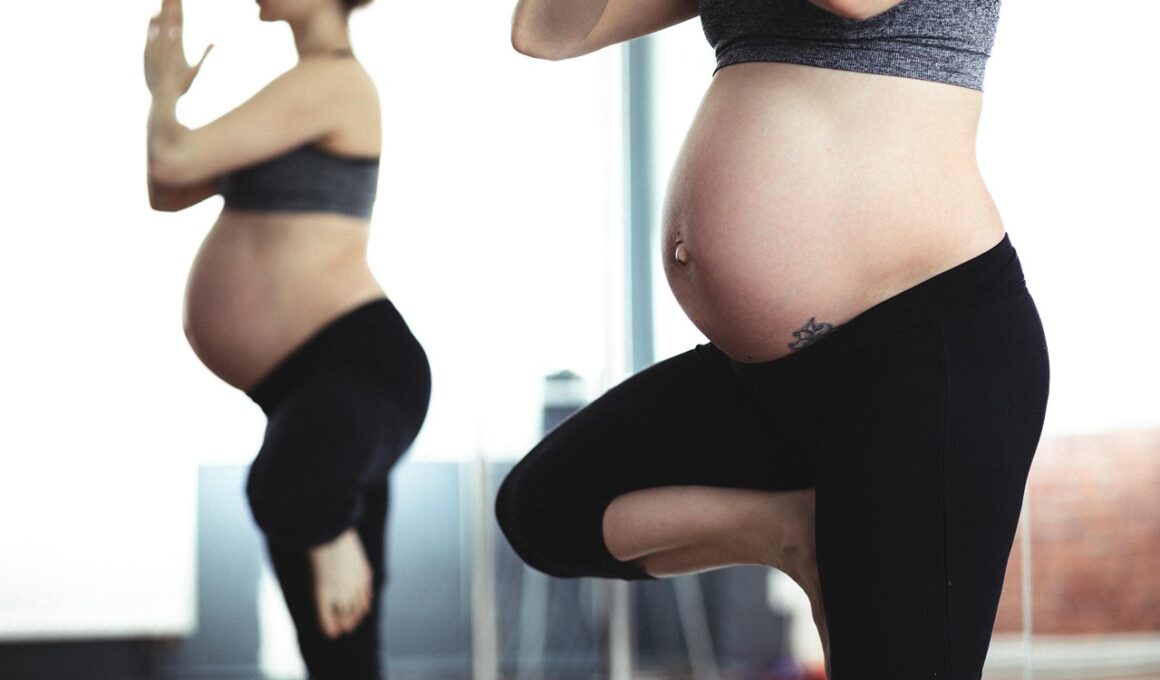How Severe Anemia Affects Prenatal Workout Safety
Severe anemia during pregnancy can pose significant challenges to fitness and overall wellbeing. Pregnant women suffering from this condition may find their energy levels drastically reduced. This lack of energy can severely limit their ability to perform even moderate exercise routines. Fatigue may become the norm, leading them to avoid physical activity altogether. Pregnancy already mandates careful management of fitness, and severe anemia complicates this process. Women may need to modify their workout plans to ensure safety and comfort during this crucial time. Understanding the effects of anemia is essential for expecting mothers. It is vital to listen to one’s body and adapt workouts accordingly. Moreover, engaging healthcare providers for guidance becomes crucial. Specific exercises might need to be avoided to prevent any risk to both mother and baby. For example, high-impact or overly strenuous activities could elevate risks associated with this condition. Awareness of personal health status allows women to make informed choices related to fitness. Adopting a tailored approach can maintain overall health while still fostering a positive exercise environment.
In addition to reducing energy levels, severe anemia can lead to dizziness and fainting spells. These symptoms can occur even during simple exercises, making it essential for women to be cautious. Engaging in physical activities without assessment can lead to dangerous situations. Women should prioritize their safety and that of their unborn child. Consulting with healthcare professionals is crucial when experiencing symptoms of anemia. They can assist in creating safe fitness plans that consider both hemoglobin levels and physical capabilities. Some low-impact exercises may still be appropriate, emphasizing gentle movements that promote blood circulation. Walking, prenatal yoga, and swimming could potentially support health, as long as the mother feels comfortable. The key is understanding personal limitations while fostering a motivating and encouraging atmosphere. Building strength can be beneficial as well, but it should always align with current energy levels and physical endurance. Staying hydrated and well-nourished further aids the ability to engage in physical activity safely. Education about anemia’s effects empowers pregnant women to navigate their fitness journey successfully, emphasizing a balanced approach to health during pregnancy.
Additionally, anemia can impact the body’s ability to oxygenate muscles effectively. Prenatal workouts that require stamina and endurance can become challenging. This limitation can lead to frustration and feelings of inadequacy regarding fitness levels. It is essential for mothers-to-be to know they are not alone in facing these obstacles. Many women have experienced similar issues and can offer mutual support and encouragement. Joining fitness groups focused on prenatal health can provide a valuable community. These connections can inspire women to pursue their fitness goals at a pace suited to their individual health conditions. While managing anemia, consistency often helps improve overall well-being. Tailored workouts focusing on strength, flexibility, and endurance can often yield positive results over time. Recognizing improvements, even small ones, can boost morale and motivation. Incorporating positive affirmations also helps transform negative feelings into a supportive mindset. Ultimately, knowing one’s body and its limitations allows informed decisions about workouts and activities. Continuous monitoring of health status and regular communication with healthcare providers fosters an atmosphere of safety and reassurance.
Physical Activity Recommendations
Apart from creating tailored workouts, proper nutrition plays a pivotal role in managing severe anemia. Consuming foods rich in iron, vitamin B12, and folate can positively affect hemoglobin levels. Leafy greens, red meats, and legumes are excellent sources of these nutrients. Pregnant women should prioritize their diets to support both their health and that of their babies. Supplements may also be necessary for those unable to achieve proper nutrient intake solely through food. Consulting with healthcare providers about necessary dietary changes is crucial. Additionally, staying hydrated and maintaining balanced meals throughout the day support adequate energy levels. This approach can enhance the capability to engage in suitable prenatal workouts. Working alongside registered dietitians may yield more personalized suggestions for oxygen-rich blood. These diet recommendations can help ensure proper muscle performance during exercise. Exercise should always accompany nutritious food intake for optimal wellness. Ultimately, focusing on a holistic approach to fitness encompasses both physical activity and nutrition. Creating a harmonious link between these elements establishes a robust foundation for a healthy pregnancy.
Moreover, establishing a regular fitness schedule, while adjusting for energy fluctuations, is beneficial. This practice promotes accountability, ensuring mothers-to-be engage in some form of physical activity consistently. Consistency assists in maintaining physical fitness and combating symptoms associated with anemia. Scheduling workouts for times when energy levels are highest, often morning hours, can yield better results and engagement. Additionally, fostering a flexible fitness approach allows for modifications when fatigue sets in. Opting for lighter workouts or shorter durations on lower energy days ensures fitness doesn’t become a burden. Incorporating brief sessions of deep breathing or relaxation exercises may provide a refreshing change from traditional workouts. These activities can also encourage mental well-being, which holds significant importance during pregnancy. Listening to one’s body and adjusting plans accordingly can reduce feelings of frustration and help maintain motivation. Implementing community support by involving partners or friends can reinforce commitment. Their encouragement can prove invaluable on days when motivation wanes. The journey of fitness during pregnancy can be fulfilling when approached with understanding, patience, and kindness towards oneself.
Monitoring Health Progress
As women engage in prenatal workouts, monitoring health progress becomes crucial. Taking note of changes in energy levels, physical capabilities, and emotional well-being enables informed adjustments. Women should feel empowered to speak with their healthcare providers about any concerns arising during their fitness journeys. Regularly scheduled check-ups allow for discussions regarding the impacts of severe anemia and possible modifications needed in fitness plans. Tracking improvements or declines can serve as motivation to maintain or adjust strategies. Utilizing fitness apps or journals can help record daily activities, nutrition, and moods. Reflecting on this information provides insight into patterns that may arise over time. This kind of data-driven approach also empowers women by showing concrete results from their efforts. Beyond physical health, recognizing psychological well-being remains essential. Celebrating small victories fosters a sense of achievement, reinforcing positive habits. Inviting family members into the process provides additional motivation and creates a supportive environment. The prenatal journey encompasses various challenges, but with dedication to fitness, it can contribute significantly to overall health and nurturing a positive experience.
In conclusion, understanding the effects of severe anemia is vital for maintaining workout safety during pregnancy. It encourages pregnant women to prioritize their health while recognizing their limitations. Adaptations may be necessary to ensure that workouts are safe and enjoyable. Emphasizing gentle, low-impact exercises supports optimal prenatal fitness without undue strain. Regular assessment of health through communication with practitioners can further enhance safety measures. Women are encouraged to pursue nutritious diets to boost energy levels and enhance overall well-being. Community support and structured plans can transform the exercise journey into a positive experience. By acknowledging the importance of self-care, fitness can become a source of empowerment. Fostering awareness of personal capabilities allows for mindful choices that benefit both mother and child. Combining fitness with nutritional needs creates a balanced lifestyle during pregnancy. This holistic approach ensures long-term health benefits and promotes safe prenatal workouts. Lastly, embracing kindness towards oneself throughout this journey reinforces positive growth and resilience. Such practices may lay the foundation for healthy habits even after childbirth, showcasing the importance of maintaining fitness as an integral part of life.
The Essential Role of Support Systems
In potential moments of doubt or fatigue, establishing strong support systems is paramount. Strong connections with family, friends, and healthcare providers create an encouraging environment that can enhance prenatal fitness experiences. This collaborative approach can be tailored to personal needs, ensuring that women are feeling supported and motivated throughout their fitness journey. Support from peers who understand similar challenges can be invaluable, fostering a shared sense of belonging. Engaging with prenatal fitness classes or online communities also cultivates connections with others who are navigating the challenges of pregnancy. Such shared experiences allow women to exchange tips, resources, and inspiration. Finding a workout buddy can boost motivation and make exercise enjoyable. Collaboration with trainers who specialize in prenatal fitness can ensure that workouts remain safe while addressing unique concerns tied to severe anemia. Moreover, sharing updates regarding fitness journeys with family and friends provides a sense of accountability. Regular feedback and encouragement can instill a lasting commitment to physical activity. It is essential to remember that experiences vary among individuals; hence, adapting support systems can yield the best results for sustainable fitness during pregnancy.


